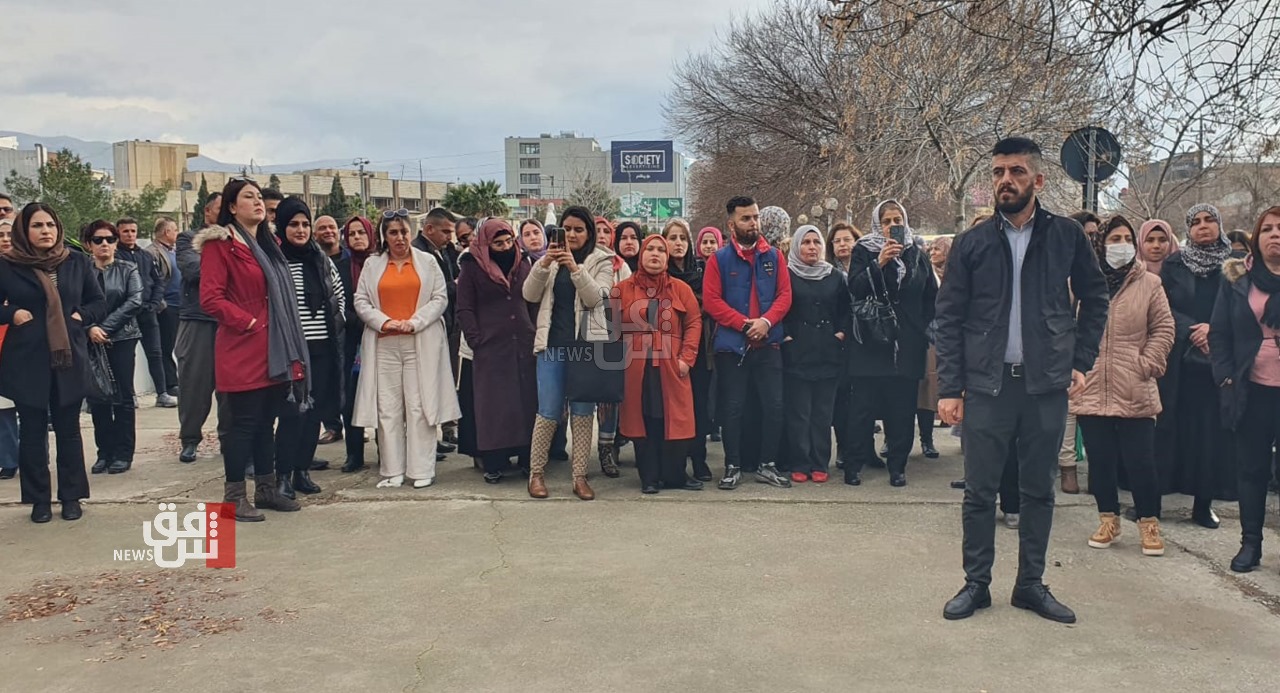Decade-long standoff: salary crisis sparks public outcry in Iraqi Kurdistan

Shafaq News/ As 2025 begins, the salary crisis in the Kurdistan Region remains contentious, sparking public concern and demands for a lasting resolution. With unpaid salaries for December 2024 still unresolved, the issue underscores a decade-long standoff between Baghdad and Erbil over oil revenues and budget allocations.
A Decade of Tensions
The long-standing crisis between the federal government in Baghdad and the Kurdistan Regional Government (KRG) traces back to 2014 when disputes over oil resource management and budget allocations began to escalate.
The war against the Islamic State (ISIS) further exacerbated these tensions, a sharp decline in global oil prices, and the economic fallout from the COVID-19 pandemic.
In 2014, Baghdad halted the transfer of the KRG’s share of the federal budget, prompting the KRG to export oil to cover public salaries and services independently. This standoff disrupted salary disbursement mechanisms, leading to a series of delays and financial backlogs that persist to this day.
At that time, the KRG was permitted to market its oil independently but must deposit the resulting revenues into a monitored bank account accessible to federal officials. Baghdad deducts these revenues from its monthly allocation to the KRG, transferring any remaining funds accordingly.
In February 2024, the Federal Supreme Court directed Baghdad to bypass the KRG and directly pay salaries to employees in the Kurdistan Region after months of delays.
However, tensions have persisted. In Parliament, Iraqi Prime Minister Mohammed Shia Al-Sudani emphasized that the salary issue is not political, but criticized the KRG for “failing” to meet its obligations under the Budget Law.
He stated that no additional transfers would be made for the Region’s salaries and confirmed that only 760 billion dinars (approximately $608 million) would be disbursed, representing the KRG’s fixed share of 12.67%.
In November 2024, the salaries issues exacerbated when Iraq's cabinet ordered the KRG to immediately transfer its oil output to the state-run Oil Marketing Company (SOMO) as part of an effort to centralize oil exports and revenue management. This directive came after Turkiye halted oil flows through the KRG’s pipeline in March, following an international arbitration ruling that required Turkiye to pay Baghdad $1.5 billion for unauthorized KRG oil exports between 2014 and 2018.
A Growing Crisis
Calls for the implementation of Federal Supreme Court rulings that mandate timely salary payments have intensified, driven by political and economic activists advocating for change.
The ongoing salary delays continue to take a heavy toll on ordinary citizens in the Kurdistan Region, with increasing frustration among the population.
Government employee Ahmad Karim shared his frustration with Shafaq News, saying, "We work hard, but we are denied our rightful pay. The constant delays in salary payments present daily challenges and undermine both our financial and mental stability."
The prolonged salary delays have also triggered a significant slowdown in the region's markets, as traders and shop owners struggle with reduced consumer spending.
Economist Suzanne Al-Sormiri explained to Shafaq News, “Most citizens depend on their salaries as their primary source of income. When these payments are delayed, it causes a downturn in local markets, jeopardizing the survival of many small and medium-sized businesses.”
With approximately 70% of households in the Kurdistan Region relying entirely on government salaries, previous delays have driven a 40% rise in personal debt levels.
Furthermore, market activity has dropped sharply, with surveys conducted by Shafaq News indicating a decline of between 30% and 50% in 2024 alone.
In addition to its economic repercussions, the crisis has had a profound impact on social relations, with rising personal debts and an increase in divorce rates driven by financial pressures. Many families are struggling to cope with the burdens of daily life.
Activist Sardar Ali told Shafaq News, “The financial crisis in the region is not just an economic issue, it is tearing apart the social fabric. We are seeing an increase in divorce rates due to financial strain and a rise in family disputes.”
He added, “Furthermore, the salary delays are pushing many young people to seek employment opportunities abroad, contributing to the disintegration of many families.”
Latest Development
Following the Paris Court’s decision to halt oil exports, the KRG now depends on non-oil revenues for funding investment projects and covering operational expenses. The member of the Iraqi Parliament's Finance Committee Nermin Maarouf told Shafak News earlier.
“The KRG's non-oil revenues are reported to total around 4 trillion dinars, compared to Iraq's national non-oil revenues of 12 trillion dinars. The KRG has received less than 11 trillion dinars for salaries, and December salaries have not yet been paid,” she explained.
The KRG needs one trillion Iraqi dinars ($762.86 million) per month to cover salaries for employees and retirees, she added.
“Without the Federal Supreme Court ruling obligating the federal government to pay salaries, the KRG would have been forced to use its limited revenues to fund them,” Maarouf continued.
In addition, the Iraqi Parliament’s Financial Committee has formed, this month, a special committee to monitor the KRG's financial entitlements for 2024 and 2025.
KRG spokesperson Peshawa Hawramani urged the federal government to ensure full salary payments for public sector employees and send the region’s share of the federal budget, noting that “less than 7% of the region’s financial entitlements have been sent and that December salaries are still pending.”
Calls for Lasting Solutions
As public pressure mounts, observers and analysts are calling for long-term solutions to be implemented by both Baghdad and Erbil. Political analyst Hawri Karzan told Shafaq News.
The solution requires genuine political will and a serious commitment to implementing Federal Court rulings to secure employees' salaries without political interference.
Political analyst Fakher Ezzeddine told Shafaq News, “The solutions are not complicated, but they require genuine commitment from both sides to implement the Federal Court's decisions.”
A joint committee should be formed by both governments to establish clear and binding mechanisms for salary payments, free from political manipulation, with transparency in revenue management to ensure citizens' rights, he suggested.